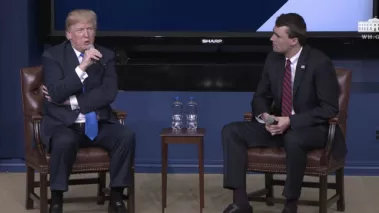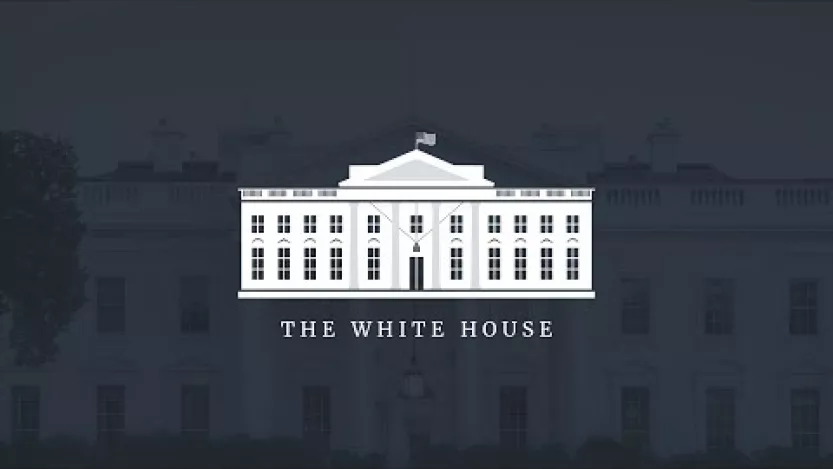Table of Contents
White House forum discusses free speech on campus

Yesterday afternoon, I attended the White House’s “Generation Next Forum,” which highlighted a range of issues, including the state of free speech on college campuses.
The nearly two-hour-long event was punctuated by a brief appearance by President Trump, who was interviewed by Charlie Kirk, the leader of conservative group Turning Point USA.

Kirk asked the president the following question:
One of the other things you’ve done so successfully during your campaign and presidency is crush political correctness and the college network we represent — I represent an organization on 1200 college and high school campuses — is its harder than ever to espouse support of your presidency and the ideas your fighting for. So thank you for what you’re doing to help give us the courage of our convictions to fight against political correctness, but what advice do you have for young patriots and conservatives on campus support your agenda that are being ridiculed and silenced because of administrators that are clamping down on free speech?”
I would have been interested to hear President Trump’s response to this question, but he instead took the question to be about the number of student supporters he has on campus. He replied:
So Charlie, it’s a great question. I think the numbers are actually much different than people think. I think we have a lot of support. If they have one campus, or two campuses that, we know what they are, it gets all the publicity. We have campuses where you have a vast majority of people that are perhaps like many of the people in this room. You can call it conservative, you can call it whatever you want, but there are people that want free speech. If you look at what’s going on with free speech, with the super left, with Antifa, with all of these characters, I’ll tell you, they get a lot of publicity, but if you go to the real campuses and you go all over the country, you go out to the middle west, you go out even to the coast in many cases, we have tremendous support. I would say we have majority support. I think it’s highly overblown, highly overblown.
While Trump obviously didn’t answer the question the way that I expected, that’s a fairly common occurrence when politicians are being interviewed. I didn’t think much more about it at the time, and it wasn’t until after I left the event that I checked my email and saw that President Trump’s response was being reported as though he had said that free speech problems on campus are “highly overblown.” People, of course, have the right to interpret Trump’s remarks as they see fit. But having been in the audience, it was clear to me that he was saying that the idea that young people on campuses are overwhelmingly opposed to him was “highly overblown.” Perhaps Trump does think that free speech problems on campus are highly overblown, as well, but his remarks yesterday seemed to address his perception of the popularity of his administration on campus.
The final panel of the forum, moderated by presidential counselor Kellyanne Conway, specifically addressed what the White House called the “free speech crisis on campus.” Sarah Flores, the Department of Justice’s Director of Public Affairs, explained the Department of Justice’s current efforts to fight campus censorship, including the filing of “statements of interest” in recent campus free speech litigation. Flores also touched on the violence at Middlebury College and unlawful speech codes.
Whether or not you believe that there is a campus speech “crisis,” our voluminous case archives, the daily articles on our newsdesk, and our latest 2018 Spotlight on Speech Codes Report demonstrate that threats to free speech are all too common on campuses for students across the political spectrum. For the health of our democratic society, campuses need to be among the freest places to speak and to challenge established beliefs. That’s why there is widespread, nonpartisan agreement about the value of free speech on campus — from Barack Obama to Bernie Sanders, and from Mitch McConnell to Jeff Sessions.
FIRE is glad that the White House is taking an interest in this issue, and we are also appreciative of the Department of Justice’s efforts to aid in the fight against unconstitutional speech codes on campus. We remind everyone that free speech is not a partisan issue. Government officials must defend speech for all, and we encourage them to highlight the diverse risks to free speech rights that exist across the political spectrum.
As always, if you or someone you know experiences campus censorship, please let us know immediately.
Recent Articles
FIRE’s award-winning Newsdesk covers the free speech news you need to stay informed.

FIRE statement on immigration judge’s ruling that deportation of Mahmoud Khalil can proceed

FIRE comment to FCC calls for review of regulations that may violate the First Amendment

FIRE welcomes Allison Hayward to board of directors
